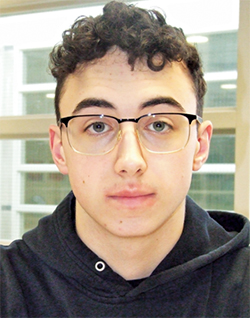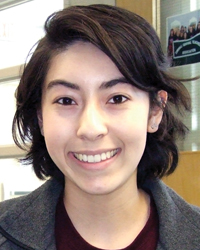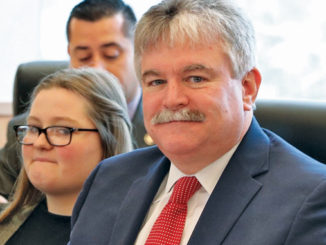
This year’s Orange-Ulster BOCES computer networking team failed to reach the national semi-finals in the CyberPatriot National Youth Cyber Defense Competition. Competing in the state finals, the team fell short by two points. Among the competitors, making a second trip to states, was Cornwall High School senior Matt Rodgers-Aniello.
“It was exhilarating, but also nerve-racking,” Rodgers-Aniello said of making the state finals. “Our entire goal was to make it to nationals.”
This year’s six-person team was made up of students from Cornwall, Pine Bush, Washingtonville, and Minisink. All competed last year and brought more experience to the competition. Only one member of Rodgers-Aniello’s team last year returned.
“This year we were in a higher tier,” Rodgers-Aniello said. “Last year we were in ‘gold’ which is the middle tier. This year we were in ‘platinum’ which is the hardest one. We had a better team this year. More of us knew what we were doing. We scored higher on everything pretty much.”
Conceived by the Air Force Association, the CyberPatriot National Youth Cyber Defense Competition entails answering forensic questions and then finding and repairing various cybersecurity issues within various images. Images included: Windows, Linux, Packet Tracer (a virtualized network set up from scratch).
Each round, of the competition, lasts six hours and involves teams from across the United States and Canada.
During the competition, team members are required to solve multiple security issues while earning points for each problem solved. Some hints explain exactly what problem needs solving while others just provide a clue as to how to find the issue. Still others the teams must find on their own.
Problems could be as simple as fixing a password, getting rid of unauthorized users, or finding a hacker’s backdoor into the computer. Other issues were more concealed and required sifting through all the computer’s files to find the problem. In some instances, it just came down to trial and error.
Last year Rodgers-Aniello said he found the competition to be challenging because of his inexperience with computer networking. Heading into this year’s competition, he and his teammates studied a lot more, however they didn’t expect the problems to be more complex due to their higher ranking.
“Instead of one-step problems, they were five-step problems. It was a huge step up from what we were used to.”
The tasks in this year’s competition were a lot harder as well due to the elite ranking. Rodgers-Aniello said the problems in this year’s state competition were ones he experienced in last year’s semi-finals. Challenges included finding back doors for hackers, having to decrypt passwords, and change file administration.
Heading into the six-hour competition, the six team members divvied up the tasks as each brought a different set of skills. Two handled Linux, two were on Windows, and the remaining two on Packet Tracer. If one person got tired, they could join another pair to lend assistance.
Rodgers-Aniello said the strategy worked to a certain extent, but he believes the team could have been a little more efficient since it fell short of its ultimate goal.



